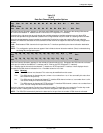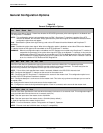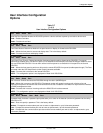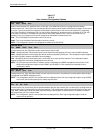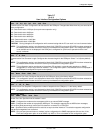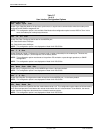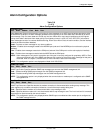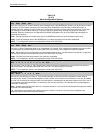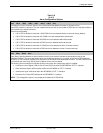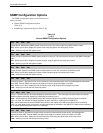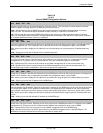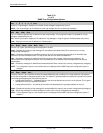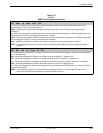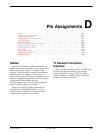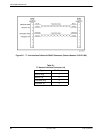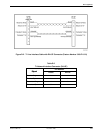
Configuration Options
C-193160-A2-GB22-10 December 1996
Table C-8
(3 of 3)
Alarm Configuration Options
Err Rate: 10E-4
Next 10E-4 10E-5 10E-6 10E-7 10E-8 10E-9 Prev
Excessive Error Rate Threshold. Sets the error rate threshold that determines when an Excessive Error
Rate (EER) condition is declared. This rate is determined by the ratio of the number of CRC6 errors to the total number of
bits received over a set period of time.
Select from the following:
• 10E-4. EER is declared if more than 1,535 CRC6 errors are detected within 10 seconds (factory default).
• 10E-5. EER is declared if more than 921 CRC6 errors are detected within 60 seconds.
• 10E-6. EER is declared if more than 92 CRC6 errors are detected within 60 seconds.
• 10E-7. EER is declared if more than 9 CRC6 errors are detected within 60 seconds.
• 10E-8. EER is declared if more than 41 CRC6 errors are detected in three 15-minute intervals.
• 10E-9. EER is declared if more than 4 CRC6 errors are detected in three 15-minute intervals.
AlrmRelay: Disab
Next Enab Disab Prev
Alarm Relay. Specifies whether an alarm condition for this circuit card will activate the shared alarm relay on the
3000 Series Carrier. The alarm deactivates when the condition(s) causing it is corrected. An Alarm Cut-Off issued from
the SDCP (or PC Emulation program) for a particular 3161 DSU/CSU also deactivates the alarm. The 3161 DSU/CSU will
not reactivate the alarm relay until all alarm conditions for the unit are cleared.
The following alarm conditions will activate the alarm relay when this configuration option is enabled:
• Continuous Loss of Signal (LOS) or Out of Frame (OOF) at either the NETWORK or DTE T1 interface.
• Alarm Indication Signal (AIS) received at either the NETWORK or DTE T1 interface.
• Yellow alarm signal received at either the NETWORK or DTE T1 interface.
• Excessive Error Rate (EER) detected at the NETWORK T1 interface.
NOTE: This configuration option is only displayed for Model 3161 DSU/CSUs.



